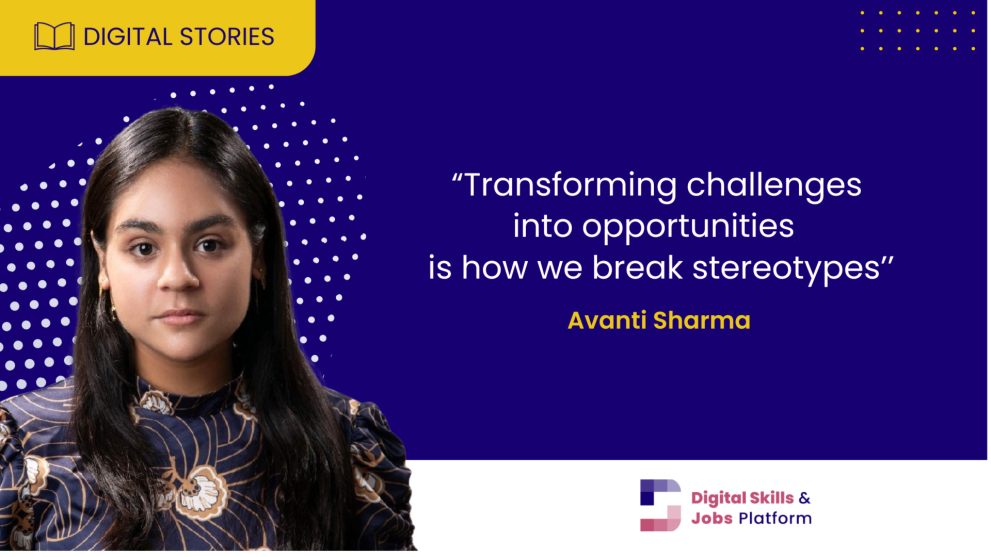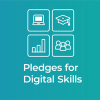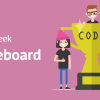Digital Story: dare to dream, dare to lead

Get to know Avanti Sharma, the 18-year-old preteen technology specialist and head of Business Development at Workshop for Me. She was a guest speaker on the Digital Skills Talks 8th episode: "Addressing the digital skills gap through coding: the impact of Code Week" along with Stamatios Papadakis, President of the EU Code Week Council and Assistant Professor at the University of Crete. You can rewatch the episode here. Sharma defines herself as "just an ordinary schoolgirl", but behind her unassuming demeanour lies a passionate advocate for the next generation of digital innovators, with a knack for coding and a vision for reshaping the future of tech literacy. In this interview, she shares her journey, insights, and advice for young people eager to step into the world of tech.
About Workshop for Me
Workshop for Me is a non-profit organization committed to shaping the leaders of tomorrow by equipping children aged 6 to 16 with programming and technology skills. The organization fosters innovation and strives to drive change in the digital sector through weekly workshops and active advocacy at conferences and events.
Could you tell us more about the idea behind workshop for me and what looks like what you do now?
Workshop for Me was founded by my mother, a software professional, who wanted to teach my brother the same skills she had learned. At the time, my brother was 7 or 8, and when she couldn’t find any suitable programs, she decided to create one herself. She figured if she needed it, other parents might too.
What makes Workshop for me unique was its peer-to-peer learning model, where older students teach younger ones. Over time, those students grow up and teach the next generation, creating a full cycle. We also focus on making learning fun, informal, and homely, which fosters creativity and helps with peer learning. Unlike traditional schools, we allow children to learn at their own pace, whether they progress quickly or take time to fully grasp concepts.
I joined the organization when I was 10 or 11. What I saw is that all of these children coding and creating these really fun things. As a child I was very creative and loved art, so when I saw them creating these cool projects. I said, oh, I want to do that too. And that's actually how I got into it. Then my brother actually encouraged me to continue because I noticed that there weren't very many girls in the sector, so I was going to stop. But he was actually like, no, I mean, if you don't see that many girls, then you have to be the one to inspire others to do it. So that's actually how I continued coding.
What do you envision yourself doing in the future?
I'm still a high school student, but I'll be going to university next year. I think that one thing which is maybe important to me is that I'm also just a normal like I'm just an ordinary schoolgirl. I am deeply passionate about clean energy, sustainable solutions, and technology. The idea of merging all three truly excites and inspires me. We need to fundamentally shift how we think about energy and technology.
Carbon capture is becoming increasingly prevalent, and I believe it has immense potential for advancement. The production of renewable energy through wind and solar, as well as the expansion of safer nuclear technologies like thorium-based reactors compared to uranium-based ones, should also be a focus. Harnessing technology for energy is a cause I am deeply drawn to because energy is the foundation of so much progress.
What would you say to all the young girls that would like to start a career in this field? What are the challenges that they need to consider?
I want them to stay motivated because their drive, ambition, and passion are exactly what we need. Challenges, to me, are opportunities to overcome barriers. For instance, being the only woman in the room can be daunting, but it’s also something to be proud of, it means they’ve earned their place. With that position comes the responsibility to empower other women and girls to follow in their footsteps. Transforming challenges into opportunities is how we break stereotypes.
If your mom didn’t work in this field, and your dad or brother weren’t into technology, would you still have developed this passion? Do schools or extracurriculars help young people explore and develop an interest in technology?
I believe schools and organizations need to do more to encourage coding, technology, and digital literacy. As a member of Gen Z, I’ve noticed technology is often dismissed or restricted by teachers and many adults due to the perception that it’s harmful. The education system, designed decades ago, hasn’t fully adapted to modern advancements. Teachers, as much as they try, often rely on methods they experienced 30 years ago when they were students themselves, but the landscape has completely changed. We should focus on embracing new technology and fostering a passion for it. Interest in technology is rising, and people want to learn and create more, but the institutions surrounding education need to support and align with this shift.
What do you think that you can do in the future to inspire more people, besides the activities that you have already done? How do you think that technology can change in the future but can also help?
I’ve developed a first-of-its-kind concept called Codeutainment, where coding, science, and technology converge in the form of a thrilling movie experience in a cinema hall. The project launched in 2019, went global online in 2020 during the pandemic, and is now back in 2024 for its third edition. This year, the theme is widening the horizons and impact of Codeutainment. Learning is often seen as separate from entertainment, but the idea behind Codeutainment is to merge the two: to associate learning with something fun and engaging, like watching a live show in a cinema. For this year’s event in Luxembourg, we’re incorporating music as a focus to show how technology influences everyday life, from devices like Google Home to patterns in music. One highlight is an orchestra performance demonstrating the interplay of technology and music. Our goal is to demystify coding and technology, showing how it’s a tangible part of our lives.
I also believe Europe has immense potential to reclaim its position as a global technology leader. Europe was a pioneer in innovation in the mid-1900s, before manufacturing shifts to China. By empowering citizens through initiatives like EU Code Week and promoting digital literacy, the EU can drive forward and rise as a leader in technology and innovation once again.
So how can EU Code Week totally prepare young people for the future?
EU Code Week is a fantastic initiative with many benefits for young people, but what stands out to me is its focus on bridging the gap between theoretical coding and practical applications. Through workshops like Meet and Code, participants can see how coding influences our everyday lives—how technology impacts even simple routines like a morning walk.
This idea of making coding tangible is something my organization, Workshop for Me, also emphasizes, and it’s a core focus of EU Code Week. By showing young people how coding connects to the real world, Code Week has the power to inspire and make a lasting impact.





